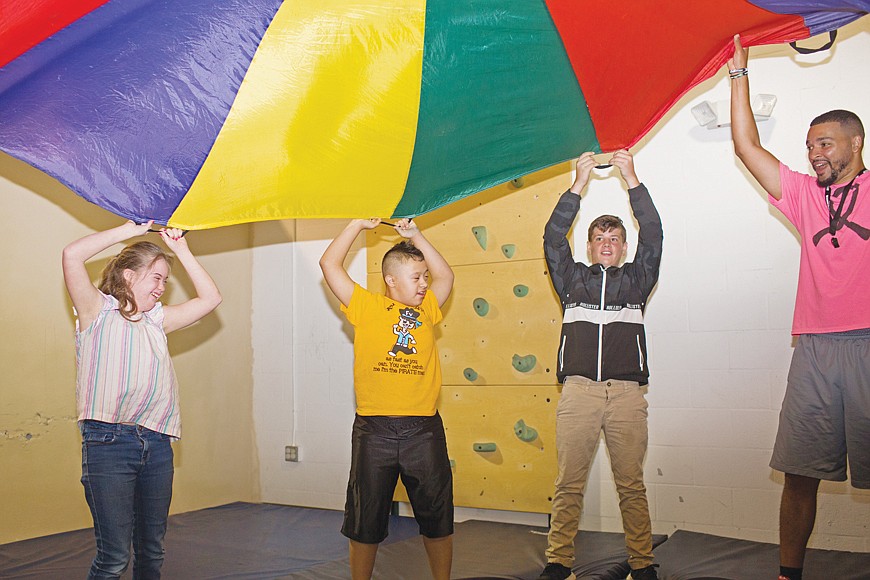- April 18, 2024
-
-
Loading

Loading

It all started in the parking lot of a private school catering to children on the autism spectrum. Moms would drop their kids off, the sound of tantrums ringing in their ears, and head to their cars in tears. Other mothers would rush to console them. They’d exchange advice and ideas on treatments and coping techniques, and simply show that they were there for each other.
An ad hoc support group was born. Donna Donnelly, the mother of a 3-year-old girl on the spectrum, was part of it. So was Catherine Peabody, who had a 3-year-old son with a similar disorder. It was 2004. Something had to be done — not out of grievance with the school, but to provide parents with more choices.
In 2007, Peabody, along with her husband, Chris, started a small Applied Behavior Analysis clinic and called it Beyond the Spectrum. Donnelly took a job as the bookkeeper. The program grew, and three years later the Peabodys reopened Beyond the Spectrum as a full-fledged education and treatment center for kids with autism and related disorders.
Today, the facility has three distinct programs that treat and educate roughly 100 children in student-to-teacher ratios that do not exceed 4-to-1. The school’s staff includes 42 full-timers and three part-timers, as well as an array of contracted on-site therapists specializing in occupational, speech, music and other therapy disciplines. Although most students live locally, some come from as far south as Punta Gorda or as far north as Hillsborough County.
Donnelly now serves as the organization’s executive director. “We aim to be a one-stop shop,” she says. “We’re a very different school — the only one [in the area] that does all of these programs and therapies on-site and at no additional cost.”
She says tuition ranges from around $12,000 to $17,000 a year, but adds most students benefit from some type of scholarship assistance. Beyond the Spectrum has had a waiting list of 50 children since last year. “It pains us to turn people away,” she says.
The board and administrators hope to eventually move the school from its current 9,000-square-foot space into a bigger building in a business district just south of University Parkway in the coming years.
Donnelly says when her daughter, Shannon, was 3 in 2004, one in 500 children was diagnosed with autism. Today, that number is one in 59. The majority of these students are boys. “We have maybe 10 girls here,” Donnelly says.
Ashley Yaeckel is a mother to one of the students. Johnathan, 8, is in the third grade in the school’s Monarch Academy, which is tailored to children on the high end of the spectrum. The Monarch program, which adheres to Common Core standards and goes through 12th grade, offers students a high school diploma. Yaeckel’s son has high-functioning Asperger’s syndrome, severe ADHD and sensory issues, but overall she says, “He’s a little more put together than some.”
Johnathan landed at Beyond the Spectrum two years ago after encountering problems at two previous schools. Since then, his grades and behavior have shown marked improvement, and he’s made friends, some of whom are on his special needs soccer team. “I have never seen this kid more excited to go to school,” says Yaeckel, who drives every day from Palmetto. “In kindergarten, he cried all the way to and from school for no apparent reason. These days, the improvement in the transition time between school and home has probably been the biggest help to me as his mother. He gets in the car and most of the time he’s excited and happy. He’ll say, (his teacher) ‘Miss Betsy said I did great today.’ Before, he couldn’t remember a thing.”
Much of Beyond the Spectrum’s success hinges on its customized approach to learning. Students are able to stay with the same teachers throughout the day, as opposed to shifting from one to another, as they would in a traditional middle or high school setting. This consistency better enables the students to stay on track.
“All of our kids learn differently — some are auditory, some learn tactilely,” Donnelly says. “Some learn better standing up, some have to move every half hour. Some need the lights to be lowered, some need extra time to process.”
Donnelly says she and her staff recognize that autism is a “family diagnosis.” It doesn’t just affect the child. It affects the parents, grandparents and siblings. “We understand the worries,” she says.